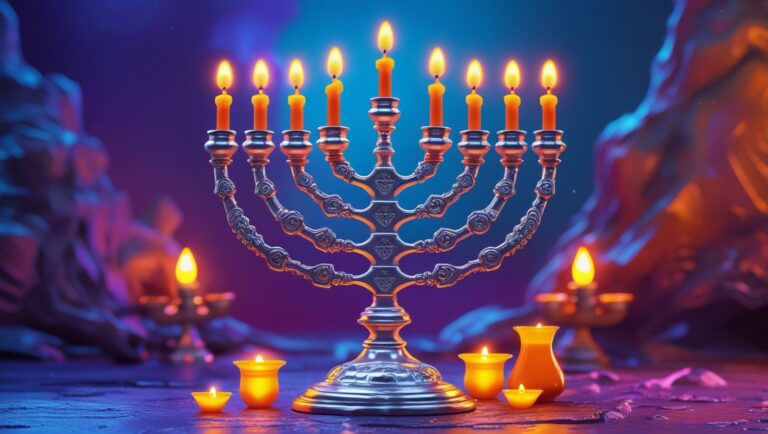Teshuva, the greatest gift from Hashem, which is rooted in the Sephira of Binah of Atzilut, is open for everyone, everywhere and anytime, until the time of Mashiach (Redemption)
Unless you’ve been living under a rock, you understand we are living in critical times.
I’m not even talking about the massive civil unrest everywhere, rampant anti-semitism, or the increasing divide in society between those that blindly follow the authorities’ whimsical decrees and those who understand that the government is not working for your benefit.
All these things are very clear now, and increasingly so even in Israel.
But, as things are scaling up, we are fast approaching the point of no return for humanity when war will be inevitable. And, according to our prophets, it will be a war that will destroy the world.
I don’t know how much time we have, maybe a few years or a few decades, but Mashiach (the anointed one) will come, and it won’t be with unicorns and cotton candy.
Let’s see a few signs of why we should all start doing Teshuva today.
What Teshuva really is and from a Kabbalistic perspective
Teshuva literally means “returning”.
It is a returning to one’s spiritual source. On a basic level, if you are a Jew this means following the Halacha which is the codification of the Torah as Hashem gave us. If you are a non-Jew this means following the 7 Mitzvot of Bnei Noach, with all its Halachot. These are the basics, then comes Tikkun HaMiddot (rectification of the character traits).
But to confine Teshuva to mere words is to overlook its deep essence, especially from a Kabbalistic perspective. At its core, it involves a return to one’s true self, a reconciliation with Hashem, and a restoration of harmony in one’s inner and outer world. It’s an invitation to personal transformation, beckoning the soul to awaken from its slumber. When a Partzuf is in slumber (called “Dormita”), it only has Mokhin D’Katnut (constricted divine intellect of Yibur + Yenikah, or only the first one). Teshuva, accompanied by all the actions and prayers we are supposed to do together with the Mitzvot effects the bringing of the Mokhin of Gadlut.
In the Torah, specifically in Devarim 10:12, Moshe implores every Jew with these words:
“And now, Israel, what does the Lord your God ask of you but to fear the Lord your God?” Similarly, in the scriptures, King Shlomo concludes his writings in Kohelet by asserting: “The end of the matter, all having been heard, is to fear God and keep His commandments, for this is the entirety of man.” Recognized as the wisest and one of the wealthiest individuals to ever live, King Shlomo experienced every conceivable luxury and pleasure. His counsel, therefore, should carry immense weight.
After all is said and done in life, what will really count is the degree to which one feared Hashem. Indeed, the Zohar writes that this attribute will determine our status in Olam HaBah (world to come) because it carries so much weight and makes one actually pursue the Mitzvot and Torah study.
The journey of Teshuva, especially from a Kabbalistic perspective, involves returning the letter ה (Heh) to the letters יהו (Yud, Heh, Vav) of the Tetragrammaton, symbolizing the reunion of Zeir Anpin and Nukvah, the male and female aspects of the Divine presence. This union reflects the ultimate aim of Teshuva: to restore harmony within ourselves, in our relationships, and with Hashem. Just as the Shekhina, symbolized by the ה of the Tetragrammaton was sent to these lowly worlds of Beriyah, Yetzirah and Assiyah to lift up the sparks, so too our Nefashot (the lowest part of our souls) was sent to the physical world to perform its spiritual world.
As we embrace the path of Teshuva while performing Torah and Mitzvot, we are bringing forth the name of Ma”H (Gematria 45) of Hashem to rectify the fallen vessels and, not surprisingly, Geulah (redemption) is also Gematria 45. This means that at every act we perform in accordance with Hashem’s will, we are bringing a mini-Geulah.
The world has a beginning, a middle, and an end
Did I tell you that in the introduction of Etz Chaim, Rav Chaim Vital goes on a lament in which he wonders how the [macro] Geulah had not come yet? Astounded by this fact, he writes that all the signs have (supposedly) already passed, all the misfortunes were (supposedly) already there, and the world had degenerated to a point beyond belief. This was about 450 years ago.
For once, let us try to attribute our misfortunes to the most honest and simple reason, the reason given to us by Hashem, as it says in the prophecy of Yechezkel (39):
“Israel went into exile because of their iniquity, because they were not faithful with me, therefore I hid my face from them, and gave them into the hands of their enemies, so they fell by the sword, all of them. According to their uncleanness and according to their transgressions have I done to them, and I hid my face from them”.
Sure, Mashiach didn’t come then because we all have our Avodat Hashem to perform in these later generations. And for sure we won’t all need to be Tzaddikim to bring him. He will indeed complete the work leading us into the path we will follow.
There’s some solace into coming to this world to rectify ourselves and still have time. As I wrote in other articles, reincarnation can happen after 10, 100, 1000 years (or anything in between), and the fact that we are here is a great opportunity to rectify ourselves.
But once Mashiach comes, it’s game over. And this is why the Gaon of Vilna was crying on his deathbed, over the fact that for some little money he could buy Tztzit and once he’d pass on to the next world, there is no more Teshuva.
The Importance of doing Teshuva
Every word spoken by a person is subject to judgment; not even the most minor expression goes unrecorded. This highlights the gravity of verbal conduct, prompting a cautionary advice to embrace solitude when possible. The reason being, offenses of speech are deemed the gravest, echoing the Tosefta Pe’ah 1’s declaration that lashon hara (evil tongue) is as severe as all other sins combined.
The enormity of this transgression, arguably the most dire, is such that “All man’s labor is for his mouth” (Ecclesiastes 6:7), suggesting that the virtues of one’s deeds and study cannot outweigh the consequences of their words. The advice from the sages, “What should be a man’s occupation in this world? He should become as a mute person” (Chullin 89a), underscores the importance of guarding one’s speech, likening sealed lips to unyielding millstones.
In Shaarei Kedusha, Rabbi Chaim Vital writes that one will be judged not only for Mitzvot and Torah, but also for the Middot.
Rabbenu Yona wrote in the first chapter of his book Shaarei Teshuva: “Among the good things that The Blessed One bestowed on His creatures is having prepared the way for them to raise from the pit of their actions and to escape the trap of their transgressions; to save themselves from destruction and to turn G- d’s wrath away from them.
In His abundant goodness and righteousness, G-d has taught and exhorted them to turn to Him upon having sinned against Him, for He knows the inclination of their hearts, as it is written: “Good and upright is The Lord, therefore He teaches sinners in the way” (Psalms 25:8). Even if they have offended and rebelled exceedingly, and even if they have been completely faithless, He does not close the doors of repentance to them, as it is written: “Turn to Whom you have profoundly rebelled against, children of Israel” (Yeshaya 31:6) and it is also written: “Return, you backsliding children and I will heal your backslidings” (Yirmiahu 2:22).
On Shabbat and Yom Tov, restraint in speech is encouraged, focusing only on the essential, reflecting the day’s sanctity and the sages’ minimal allowance for even exchanging greetings. This demonstrates the extreme care taken over every word.
The emphasis on honoring the Shabbat, maintaining its celebration without cutting corners on expenditure, resonates with the teaching that one’s annual provision is decreed between Rosh Hashanah and Yom Kippur, excluding what is spent on Sabbaths and Festivals. The plea extends to guiding one’s daughters towards peacefulness, discouraging cursing, swearing, lying, and quarreling, and instead fostering an atmosphere of peace, love, affection, and gentleness.
R. Shimon Bar Yochai lifted up his hands and wept. ‘Woe,’ he said, ‘to him who will live at that time! Yet fortunate he who will live at that time! When the Holy One comes to visit the “Hind” (Israel), he will examine who it is that remains loyal to her at that time, and then woe to him who shall not be found worthy, and of whom it shall be said, “I looked and there was none to help” (Yeshaya. 22, 23)- Many sufferings shall then befall Israel. But fortunate he who will be found faithful at that time!
(ZOHAR Shemot, 7a)
We must all do Teshuva, whether you already fulfill the Torah or haven’t started yet.
The final war
In the Zohar we find:
“Rabbi Ytzchak said: In the future seventy princes from all over the world will unite with the masses to attack Jerusalem and plot against G-d. They will plan to battle Him, then fight over His people and Temple. However, “He who sits in heaven laughs, The Lord will mock them” (Psalms 2:4). In His glory, G-d will wipe them from the face of the earth.
Rabbi Abba said in the name of Rabbi Yisa Sabba, and Rabbi Shimon Bar Yohai also said: In the future, G-d will revive (reincarnate) and reinstate all the kings who oppressed the Jewish people and ruled Jerusalem: Adrianus, Lupinus, Nevuchadnezzar, Sancheriv, and all the others who destroyed His house. They will unite with other nations. The Lord will announce: “And this will be the plague with which G-d will smite all the nations that mobilized against Jerusalem…” (Zechariah 14:12).”
Rashi, the pivotal rabbinic figure who crafted his seminal commentary on the scriptures nearly 900 years ago, interprets the Battle of Gog and Magog as Divine retribution for the myriad injustices faced by the Jewish people throughout history. This interpretation is found in his commentary on Yechezkel 38.
Similarly, the Ramak (Rabbi Moshe Cordovero) suggests that in the end times, nations will unify with the sinister intention of annihilating the Jewish people, provoked by the establishment of a Jewish sovereign state. This period, he warns, will be marked by unprecedented tribulation.
The Midrash Vayesha elaborates on this eschatological scenario, stating, “In the era of the Messiah, Gog and Magog will mobilize against Israel. Led by Gog, they will rally nations to besiege Jerusalem.”.
Furthermore, commentators like Metzudat David and Ibn Ezra expand on this narrative, positing that this conflict will also purify the Jewish people by separating out those sinners who are unworthy of experiencing the forthcoming redemption and the blessings destined for the Jewish people.
“For behold, the day is coming, burning like an oven when all arrogant and evildoers will be straw. And the Day that is coming shall burn them up, says the Lord of hosts, so that it will leave them neither root nor branch. But to you who fear My name, the sun of righteousness shall arise with healing in its wings. And you shall go out and leap like calves from the stall. And you shall tread down the wicked for they shall be ashes under the sole of your feet on the Day I do this, says the Lord of Hosts.”
(Malachi 3,19-22)
So, contrary to what many fake rabbis out there say, Mashiach will not come to “make peace” and everything will continue on his way. This will be after the final war and there will be punishment, because the entire purpose of Creation and the Torah is predicated on Din (judgments).
R. Abba quoted here the verse “Who is this that comes from Edom, with dyed garments from Bozrah?” (Yeshaya. 68). ‘G-d’, he said, ‘will one day put on garments of vengeance to chastise Edom for having destroyed His house and burnt His Temple and driven the Community of Israel into exile among the nations.
He will wreak vengeance on them until all the mountains are full of the slain of the nations, when he will summon all birds of the air and the beasts of the field and they shall feast on them, the beasts twelve months and the birds seven years, and the earth shall not bear the stench thereof. G-d shall come from Bozrah, because from there the world’s hosts went forth to war against Jerusalem, and they began to burn the Temple, and the children of Edom threw down the walls and destroyed the foundations. G-d will be “glorious in his apparel”, His robes of vengeance, and “marching in the greatness of his strength”.
(Zohar, Emor 89)
Concluding remarks
I realize many people are Baalei Teshuva like me, but we are all equally commanded to fulfill the entire Torah. But really, doing Teshuva, at least the basics, is actually easier than it seems. The reward for it is beyond our comprehension in the Olam HaBah. The opposite is equally true.
Rabbi Abba provided insights on the verse from Micah 7:15, stating, “As in the days of your departure from Egypt, I will show him wonders.” He interpreted this as Hashem promising a future redemption for His children, mirroring the miraculous exodus from Egypt, where plagues were unleashed upon Egypt for Israel’s sake.
However, he pointed out a significant distinction: whereas the liberation from Egypt involved escape from a single ruler and nation, the future deliverance will encompass freedom from the oppression of all the world’s rulers. This universal redemption will magnify Hashem’s glory globally, making His sovereign power known universally, as prophesied in Zechariah 14:9, “The Lord will be king over all the earth.”
In this era of global deliverance, nations will honor Israel, presenting the Jewish people as an offering to the Almighty, fulfilling the prophecy in Yeshaya 66:20. Additionally, the forefathers will witness this unparalleled redemption with joy, witnessing the fulfillment of Hashem’s promise of wonders, akin to those witnessed during the Exodus from Egypt. (Zohar, Tazria 52A)
“The Sages and prophets did not yearn for the Messianic Era in order that [the Jews] rule over the entire world, nor in order that they have dominion over the gentiles, nor that they be exalted through them, nor in order that they eat, drink and celebrate. Rather, their aspiration was that [the Jews] be free to involve themselves in Torah and its wisdom, without anyone to oppress or disturb them, and thus be found worthy of life in the World to Come”. (Rambam Mishne Torah, Laws of Kings)
However:
“It will be very difficult to remain firm in faith, and not be misled by everyone’s mistaken beliefs in the pre Messianic era. At that time, many who call themselves religious leaders will preach falsehood. A group like ours, where people gather together, thirsting for G-d’s word, will no longer exist. There will be some truly religious individuals, but they will be very few and far between.” This is from Sichot HaRan from Rebbe Nachman of Breslov
Rabbi Nachman then quoted the verse: “Write this as a record in a book” (Exodus 17:14). In days to come let people know that there was someone who already predicted this. Then they will know and be encouraged in their faith”. (Sichot HaRan 126)
And one last piece of advice:
“Rabbi Elazar was asked by his students: what will a man do to be spared from the pains of the arrival of the Mashiach? Let him occupy himself with the Torah and let him perform acts of kindness” (Talmud Sanhedrin 98a)
May we all merit real Teshuva from love of Hashem, in which all our sins become merits.







